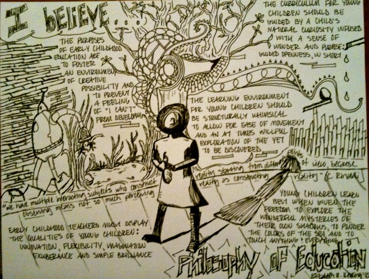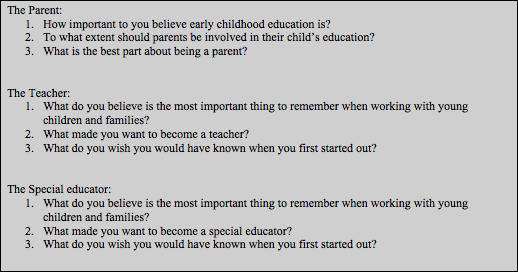Special Assignment - Critical Thinking
Attention

Learning Outcomes
Upon completion of this lesson's material, students will be able
- Gather information as part of the critical thinking process.
- Use critical thinking skills to draft a philosophy of early childhood education statement.
- Discuss the importance of critical thinking skills in professional growth.
Teaching
At this stage of your learning you have gained a variety of knowledge related to early childhood education. You have met several people who have several opinions about what early childhood education should look like, what constitutes best practice and how things should be done. It is not our job as educators to tell you what to think but encourage you to finding meaning in all of the information you have gathered. It is your responsibility to formulate your passions, values and beliefs that surround early childhood education.
Critical thinking is a skill sometimes used to assist in forming a personal view on a specific topic. First you use information gathered to define a baseline of beliefs. Then you use experience, new information and self-reflection to inform your beliefs and adjust as necessary. This continual critical thinking process will help you in professional and personal growth. It is also a skill that you will (hopefully) carry throughout your entire early childhood career. Your thoughts and beliefs will evolve as you learn more and gain experience with early childhood. Lifelong learning is a valuable skill if you allow yourself to open your mind and use reflective practice.
For this assignment you will combine your thoughts, voices of three other important adults, and all of the crucial information you have learned to help you determine your own baseline of philosophical beliefs.
As you read chapter 6 in Professinalism in Early Childhood Education, keep in mind the last sentence of the first paragraph. What are your commitments to this career?
Assessment
ELO-CT-Part 1
For this part of the assignment you will interview three important adults that have the largest impact on children:
The parent
The teacher
The special educator
The purposes of the interviews are to enhance your understanding of their role in the lives of children and to appreciate the different beliefs of those involved in educating them. Think about how these might inform your practice and what you would like to know to make you the best educator you are capable of. For each interview you will ask three assigned questions (see text box after the outline) and you must come up with two of your own. This totals FIVE questions per interview. Then you will provide a summary of findings into the first dropbox. The summary of findings should outline each interview as follows:
- The person interviewed
- Question 1
- Response
- Question 2
- Response
- Question 3
- Response
- Question 4
- Response
- Question 5
- Response
- What kind of information were you hoping to gain by asking the two additional questions?
- Did any of the responses surprise you? Why or why not?
- What did you gain from this interview that assisted in your professional growth?

Interview 1 |
0 Points Did not complete the interview |
7 Points Response information was incomplete and unclear |
15 Points Interview was complete. Response information was clear and understood |
Interview 2 |
0 Points Did not complete the interview |
7 Points Response information was incomplete and unclear |
15 Points Interview was complete. Response information was clear and understood |
Interview 3 |
0 Points Did not complete the interview |
7 Points Response information was incomplete and unclear |
15 Points Interview was complete. Response information was clear and understood |
Rationale for added questions |
0 Points Did not provide rationale |
7 Points Less than six questions were related to the purpose of the assignment |
15 Points All six additional questions were related to the purpose of the assignment |
Surprises |
0 Points Did not provide explanation |
7 Points Provided brief reflection process |
15 Points Reflection of interview was thoughtful and purposeful |
Professional growth |
0 Points Did not provide explanation |
7 Points Provided unclear, brief details of professional growth |
15 Points Provided clear, solid details of professional growth |
Mechanics
|
0 Points Written with unacceptable spelling, grammar, and/or syntax errors |
5 Points Errors in mechanics are minor, but are somewhat distracting from the message. |
10 Points No substantial errors in spelling, grammar, and/or syntax, or APA Citations. |
ELO-CT-Part 2
- First find a meaningful quote (or two) that speaks to you. This quote should capture your deepest values in early childhood education. This quote could easily be the center of your philosophy statement (figuratively speaking). Write down some ideas that the quote triggers for you. What kinds of I BELIEVE statements could you make based on this core value?
- Look at your interview questions and ask yourself, “What stuck out? “What did I not agree with?”
- Now think back to all of the material you have learned. What theorists do you align most with? What assignments were meaningful to you in a way that impacted what you believed in early childhood education?
- Then think back to your experiences. What kinds of early childhood practice made an impression on your growing up? How did that impact who you are now? If you have been working with children, how have your experiences with young children empowered you to get where you are today?
- Finally, dig out your outline of philosophical beliefs from practicum one. Do these beliefs still apply? How have they changed? What would you add or take away? What do you want to clarify and know more about before making a bold statement that represents who you are?
As you start to make connections and discover common themes about your beliefs, turn them into sentences and start your draft philosophy statement. Your statement should be no longer than a page and reflect only your beliefs about early childhood education. Your introduction should contain a strong statement that encompasses your beliefs. Your body will explain your core beliefs and provide follow up to your strong statement. You should include specific brief examples and individual strengths. In conclusion you will revisit the statement and summarize your main thoughts. Follow the rubric for further guidance.
Introduction
|
0 Points Did not provide an introduction |
5 Points Introduction was brief and somewhat related to the body |
10 Points Introduction provided a clear strong statement that encompasses the beliefs laid out in the body |
Body
|
0 Points Did not provide a body |
5 Points Body identified some value and beliefs that somewhat related to the introduction |
10 Points Body defined values and beliefs that were related to the introduction |
Conclusion
|
0 Points Did not provide a conclusion |
5 Points Conclusion was loosely tied to the statement and somewhat summarized main thoughts |
10 Points Conclusion was solid, revisited the statement and summarized main thoughts |
I believe Statements |
0 Points Was not written in first person and did not contain I believe or I will statements |
7 Points Philosophy sometimes was written in first person and contained a few I believe / I will statements |
15 Points Philosophy is written in the first person and contains I believe / I will statements |
Personal |
0 Points Philosophy was not personal or tied to personal beliefs |
7 Points Philosophy was somewhat related to personal beliefs |
15 Points Philosophy is related to personal beliefs |
Brief, specific examples |
0 Points Did not provide any examples |
7 Points Philosophy contains unclear examples that are loosely related to the philosophy |
15 Points Philosophy contains brief yet specific examples |
Individual strengths |
0 Points Did not provide individual strengths |
7 Points Philosophy somewhat displays individual strengths |
15 Points Philosophy showcases individual strengths |
Professional growth |
0 Points Did not provide explanation |
5 Points Provided unclear, brief details of professional growth |
10 Points Provided clear, solid details of professional growth |